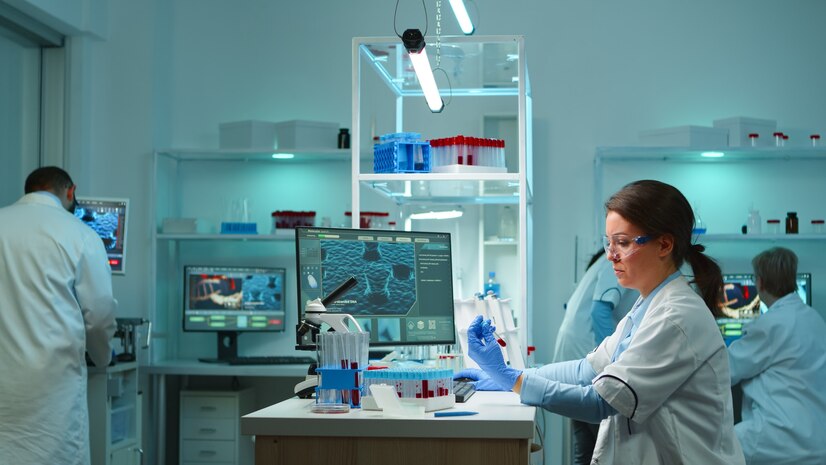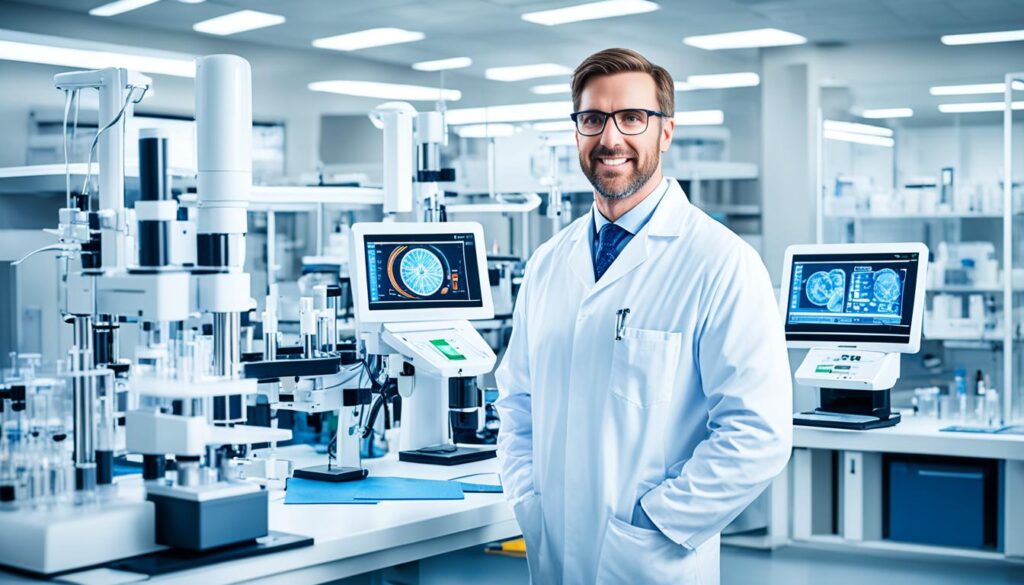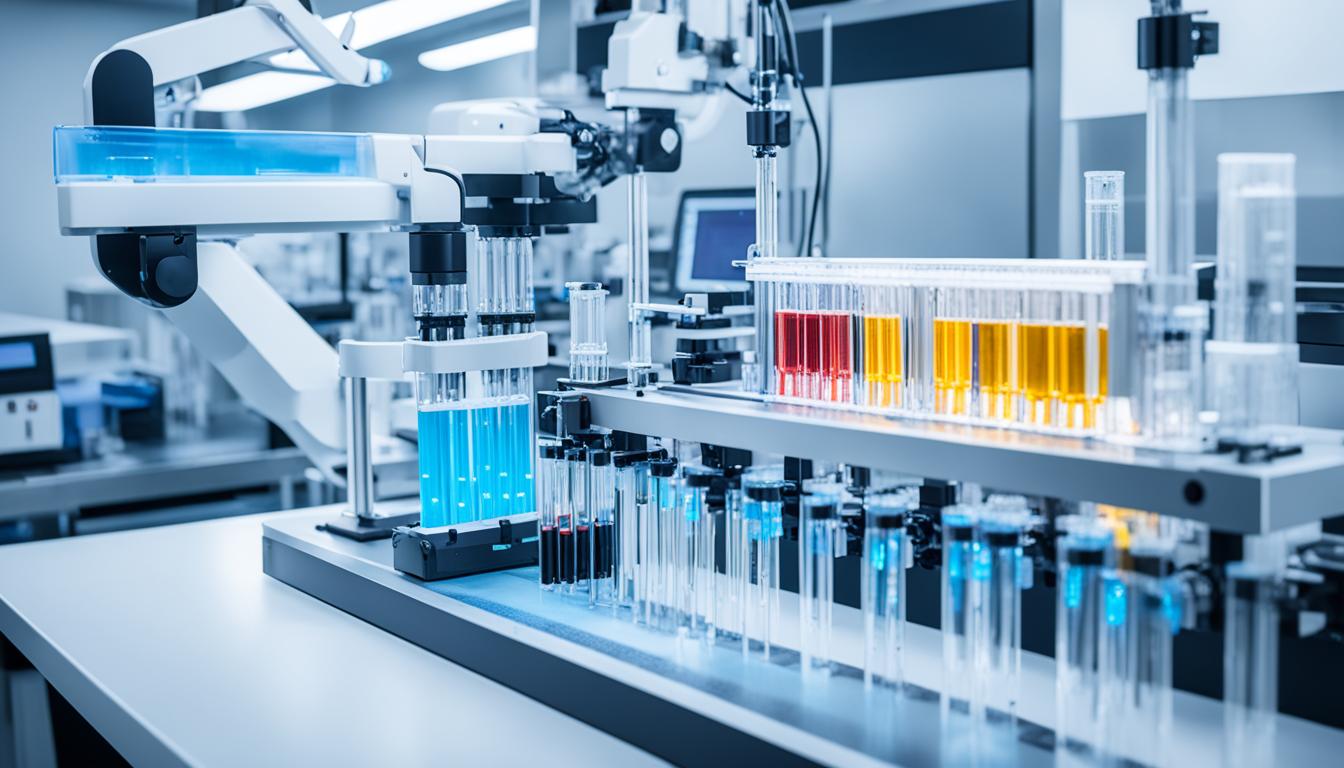The medical lab field is changing a lot due to new tech. This includes automation, robotics, and advanced sequencing. These changes are making lab work smoother, more accurate, and faster. They’re also boosting patient care and results. Let’s see how these trends are shaping the lab tech future and what they mean for lab workers.
Key Takeaways
- The medical laboratory field is experiencing a technological revolution with the introduction of advanced technologies.
- New technologies such as automation, robotics, and artificial intelligence are improving efficiency, accuracy, and productivity in medical laboratories.
- These innovations are leading to enhanced patient care and outcomes.
- Professionals in the medical laboratory field need to stay informed about the latest technological trends to adapt and thrive in the evolving landscape.
- The article will explore the key trends and their implications for medical laboratory professionals.
Introduction to New Technologies in the Medical Laboratory
The world of medical labs is changing quickly. New medical laboratory technology is making work easier and more effective. This includes modern diagnostic tools and healthcare technologies. These new trends are changing how medical professionals work together and find solutions.
Also Read : How Do Scholarship For Artists Impact Artistic Development?
The Rapidly Evolving Landscape of Laboratory Technology
Artificial intelligence (AI) is a game changer, like with ChatGPT. It’s not only impacting the lab world but also many other areas. This technology promises to spark more creativity, boost how much we get done, and perk up the medical field’s strategies.
The Importance of Embracing Technological Innovations
Keeping up with the latest advancements in diagnostic tools and tech is key for lab workers. Adapting to these improvements can make labs more efficient. It also helps better the care patients get and keeps labs successful in the ever-changing health scene.
“The recent advancements in artificial intelligence, such as ChatGPT, have already had a significant impact on various industries, including the medical laboratory field. These technological innovations have the potential to enhance creativity, boost productivity, and revolutionize the way medical professionals collaborate and innovate.”
Also Read : Loan Interest Rate: What Factors Determine It?
Continuing education in diagnostic tools and technological transformations is crucial for medical labs. These adjustments can make labs work better, improve patient care, and ensure labs thrive in the competitive field.
Automation and Robotics in the Medical Laboratory

The medical laboratory industry is changing fast because of new automated lab processes and robots. These new tools are making medical labs better at their jobs. They help labs work faster, more accurately, and increase what they can do.
Also Read : Medical Science: How Is It Improving Diagnostic Techniques?
Enhancing Efficiency, Accuracy, and Productivity
Robots and automated systems in labs are changing how work gets done. They take on repetitive tasks, which lowers the need for human effort. Labs can now process more samples quickly and more precisely than before.
The use of automated lab processes lessens the chance of mistakes by people, making results more reliable. Robotic technology also ensures that tests are done the same way every time. This adds trust to lab results.
Medical labs are becoming more efficient and accurate through the use of laboratory automation trends. This makes things better for health workers and their patients. The labs can work smoothly, without delays.
| Key Benefits of Automation and Robotics in Medical Laboratories |
|---|
|
The use of automated lab processes and robotic technology is still growing. Both will keep changing how labs work, aiming for better efficiency and accuracy in taking care of patients.
Also Read : Which Types Of Loans Are Best For Small Businesses?
Next-Generation Sequencing (NGS)

The field of genomics has seen big steps forward recently. Next-generation sequencing (NGS) leads these changes. NGS changes how we look at DNA and RNA, making things faster and more affordable. This technology is now key in labs, helping create treatment plans specific to each patient.
In labs, NGS is now essential. It helps with genetic testing and finding rare disorders. Because of NGS, healthcare pros can make treatments that fit each patient perfectly, marking a significant step in personalized medicine.
It’s vital for lab workers to keep up with NGS. This method is changing healthcare’s future. So, it’s important for them to use NGS to give their patients the best care possible.
Also Read : Car Loan: What Are The Best Options For First Time Buyers?
“Next-generation sequencing has become a game-changer in the medical laboratory, transforming our ability to diagnose and treat genetic disorders with unprecedented precision.”
NGS is quickly moving us forward in genomics. It’s helping with personalized medicine and making genetic testing better. NGS is a must-have for researchers and doctors, allowing them to find rare genes and understand complex diseases.
As NGS’s role in labs grows, staying informed is key for healthcare workers. With NGS, labs can make better diagnoses, tailor treatments, and lead in genetic studies. This improves patient care and supports personalized medicine’s growth.
Artificial Intelligence and Machine Learning

In the world of medical labs, AI and machine learning are changing how things work quickly. These new technologies make diagnostic tests better, faster, and more accurate. They are also giving new insights into medical data.
AI-Driven Diagnosis and Data Analysis
AI uses algorithms to check lots of medical data. It looks at images, samples, and test results. AI finds patterns and issues that a person might miss. This helps speed up diagnoses and make patient care better.
The use of machine learning in labs is improving data analysis even more. It helps medical workers make better choices. By handling data and spotting patterns, it offers deeper insight. This powers more accurate decisions based on data.
As AI in medical labs and machine learning applications progress, health workers need to keep up. It’s important for them to accept these changes. Using AI in diagnoses and data analysis is key for top-notch patient care and staying competitive.
“The integration of AI and machine learning in the medical laboratory is not just a trend – it’s a fundamental shift in how we approach diagnostic testing and data analysis.”
Having the tools for AI-driven diagnosis and data insights is vital for labs now. This tech can make care more tailored and effective for patients. By using the latest tech, medical labs can provide better care and results for their patients.
Point-of-Care Testing (POCT)
In the world of medical labs, point-of-care testing (POCT) is gaining momentum. It brings diagnostic tools right to the patient. This changes how we deliver healthcare.
Bringing the Medical Laboratory Closer to Patients
POCT lets tests be done quickly near the patient, often at their bedside. This is critical in emergencies, where fast results can save lives. Point-of-care testing relies on medical lab techs for proper use.
Integrating point-of-care testing into healthcare is crucial. Lab professionals must keep up with new POCT methods and controls. They make sure tests are accurate and quick, meeting patient’s needs.
One big plus of integrating POCT in healthcare is quick and precise diagnoses at the care point. This means treatments can start sooner. It helps patients get better and makes healthcare work smoother.
The medical lab field is changing fast, with POCT’s role growing. Learning about this tech helps lab techs lead in care improvement. They play a key role in offering top care to patients.
Telemedicine and Remote Monitoring
The medical laboratory field is changing because of telemedicine and remote monitoring. With more people using wearable devices and home testing kits, patients can send their samples to labs for analysis. They don’t have to visit a medical facility. This change allows medical professionals to work in virtual settings, where they test and analyze data from a distance.
Healthcare is becoming more focused on telemedicine in medical labs and remote patient monitoring. This means labs must adjust to working virtually. They need to find efficient ways to interact with patients remotely. Protecting patient data is now more important than ever.
Virtual Workflows and Data Security Considerations
Adding telemedicine and remote monitoring to labs brings both good and bad changes. On the good side, it makes care easier to access and more convenient. Patients can get tests and care without leaving home. But, it also means labs must really focus on keeping patient data safe to protect results and privacy.
Labs need to adapt to virtual healthcare workflows well. They must make sure communicating with patients is smooth and secure. This involves using strong online safety practices, creating strict rules for data, and working closely with IT teams. This helps deal with privacy and security risks linked to healthcare going digital.
The field is getting more and more into telemedicine and remote monitoring. Embracing new tech and making data safety a priority is key. This way, lab professionals can lead in making virtual healthcare flow smoothly. And in the end, make patient care better.
Medical Laboratory Technology Trends and Career Prospects

The field of medical laboratory science is rapidly evolving. It’s driven by technology advances. This evolution also changes the career path for those in the profession. Being up to date with technology trends gives you an edge. Employers look for candidates with current skills and knowledge.
Automation and robotics are becoming more common in medical labs. They improve efficiency, accuracy, and productivity. This is from processing samples to analyzing data. Professionals skilled in this area are highly sought after.
Next-generation sequencing (NGS) has changed genetic testing and personalized medicine. Workers who can analyze genomic data are more and more important. They have a critical job in the lab.
Artificial intelligence (AI) and machine learning are also shaping the medical field. They help with diagnosis and data analysis. New jobs are available in bioinformatics and data science because of these advances.
Additionally, point-of-care testing (POCT) and telemedicine are becoming more common. This shift means a need for lab professionals skilled in virtual settings. They must also keep patient data safe during remote monitoring.
Adapting to these new technologies can lead to exciting career opportunities. It enhances growth in the healthcare sector. Being open to new tech and ways of work is key. It can lead to leadership roles or becoming a specialist.
| Technological Advancements | Impact on Medical Lab Careers |
|---|---|
| Automation and Robotics | Increased demand for professionals skilled in operating and maintaining automated systems |
| Next-Generation Sequencing (NGS) | Growth in the need for experts in genetic testing and data analysis |
| Artificial Intelligence and Machine Learning | New career opportunities in bioinformatics and data science |
| Point-of-Care Testing (POCT) and Telemedicine | Demand for professionals adaptable to virtual workflows and data security |
To succeed in the medical lab field, embracing technology is vital. This positions individuals for success. It also lets them have a big impact in healthcare.
Challenges and Opportunities in Technological Integration
New technologies are quickly becoming part of medical labs, bringing both challenges and chances. It’s crucial to focus on patient safety and managing the big changes ahead.
A big issue is how to handle all the new digital data. Labs need strong systems to manage this. Making sure data can flow easily and safely is key to keeping patient records accurate and keeping them safe.
Change in labs needs to happen with speed and flexibility. Labs need to be ready for better tech, Business ways, and methods. They should look for ways to use these innovations while making sure patient care stays top-notch.
Working closely with tech experts and others in the field can make dealing with these challenges easier. This teamwork helps labs stay on top of new trends and meet their needs. It helps keep patients safe too.
Navigating Change and Ensuring Patient Safety
Adding new tech to labs brings many chances and issues. But, labs can make a big difference by managing data well, working smoothly with others, and being adaptable. They can then use new tech without forgetting about patient safety.
“The key to success in this rapidly evolving landscape is to maintain a relentless focus on patient safety while actively embracing technological advancements that can enhance efficiency, accuracy, and the overall quality of care,” states Dr. Michael Sobel, CEO of LigoLab.
Finding the right balance between innovation and care is crucial for labs. It lets them use new tech to improve how they do things and manage change well.
Labs need a solid plan to deal with the challenges of lab tech integration as tech grows. They should put patient safety considerations first and be ready to adapt. This way, labs can make the most of new tech and make sure patients get top care.
Also Read: What Are The Future Trends In Medical Technology?
Conclusion
The medical laboratory field is changing fast due to new technologies. These include automation, robotics, and artificial intelligence. They make lab work more efficient and accurate.
As these tools develop, they integrate more into healthcare. This means lab professionals need to learn about them. They ensure better patient care and find new job chances due to these changes.
It’s key to follow medical lab trends and welcome new healthcare tech. This helps labs offer better, faster services. Patients and the healthcare system benefit as a result.
The future for medical labs looks very promising. With tech and new chances, the field can grow and innovate. This way, the medical lab profession shapes the future of healthcare and patient care.
FAQs
What are the key technological advancements affecting the medical laboratory field?
The medical laboratory field is changing fast due to new technology. This includes things like automation, artificial intelligence, and more. These changes are making a big impact.
How are automation and robotics enhancing efficiency, accuracy, and productivity in the medical laboratory?
Automation is speeding up and improving lab work. It helps make things more accurate and gets results to people faster.
What is the role of next-generation sequencing (NGS) in the medical laboratory setting?
NGS is very important in labs now. It helps create personalized treatment plans and advances genetic research. It’s crucial for lab workers to understand NGS.
How are artificial intelligence (AI) and machine learning transforming the medical laboratory field?
AI and machine learning are changing how labs interpret data. They can find patterns and help diagnose diseases. These tools are making lab work more effective and efficient.
What is the significance of point-of-care testing (POCT) in the medical laboratory field?
POCT is great for fast tests and results. It’s often done where the patient is, either in a bed or a clinic. Lab workers now use POCT in many settings.
How are telemedicine and remote monitoring reshaping the medical laboratory field?
Devices and kits at home are changing how lab samples get to the lab. Patients don’t always need to go to a clinic. This shift is creating new jobs and ways of working. However, it’s important to keep data safe and work virtually well.
What are the implications of technological advancements for the career prospects of medical laboratory professionals?
Knowing the newest lab technology can help you stand out when looking for a job. Employers look for people with updated skills. Understanding and using new tech can open doors for promotions and different roles.
Source Links
- https://www.forbes.com/sites/forbesbusinesscouncil/2023/09/25/the-impact-of-current-technology-on-the-future-of-medical-laboratories/
- https://www.ncbi.nlm.nih.gov/books/NBK223043/
- https://biztechcollege.com/biztalk/medical-laboratory-technology/

